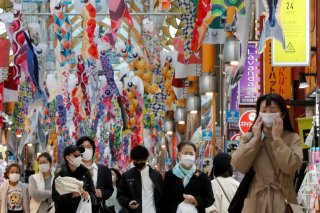Chaos: Why Japan's Coronavirus Response Could End up Hurting Its International Reputation
The Japanese government’s response to the coronavirus pandemic has been reactive, chaotic and lacking in clear leadership.
The Japanese government’s response to the coronavirus pandemic has been reactive, chaotic and lacking in clear leadership. Japan has effectively lost control of its attempts to isolate all suspected cases.
A full nationwide state of emergency was only declared on April 16, after cases rapidly expanded outside central metropolitan areas. The national emergency gave prefectures the powers to impose their own lockdown measures, but these are partial and not enforceable by law.
This followed ambiguous recommendations by the administration of Prime Minister Shinzo Abe for people across the country to practice the “three Cs”: avoiding closed spaces, concentrated gatherings and close contact.
But the government’s coronavirus strategy might be more fittingly categorised by “three As”: arrogance, anxiety and atypical. This includes over-confidence in party protocol, anxiety over making sudden societal changes and indifference towards conventional advice from foreign peers.
In some ways, this mirrors a wider pattern of the Abe administration implementing policies at home that are out-of-sync with the image Japan has of itself as a leader on the world stage. These contradictions between foreign and domestic policy have led Japan capriciously to the brink of a coronavirus disaster.
Since Abe’s return to power in 2012, Japan has set a foreign policy course aimed at regaining international prestige. This came partly as a response to domestic perceptions that Japan had damaged its reputation over the course of more than two decades of stagnation. Abe’s new agenda has been characterised by concepts of proactivity, promotion of an international rules-based system and regional leadership.
Why then, with so much at stake, has the response of his ruling Liberal Democratic Party to the coronavirus pandemic been so erratic?
Arrogance
This begins with Abe, who has strengthened his grip on power under the pretexts of strong leadership and national interest. Though often framed in patriotic rhetoric, measures introduced by the prime minister on information sharing, military expansion and media control have largely amounted to a reduction in civil liberties and the empowerment of Abe and his inner circle. This concentration of power promotes a discourse of Japanese exceptionalism focused on national pride at home and international prestige abroad.
But there is an arrogance here based on the fact that Abe’s cabinet doesn’t actually have popular approval among the Japanese public for its handling of the coronavirus response. The LDP only commands an overwhelming electoral advantage because of the broken and dysfunctional opposition, with no other party gaining far above 5% of the vote.
This has created a kind of hubris, where the ruling party acts unilaterally as if given a mandate by a huge majority of the people, due not least to the LDP’s almost unbroken grip on power since 1955. In recent years government policies have only been subjected to limited domestic media scrutiny.
Anxiety
Japan has long been considered a socially conservative country. Generally speaking, this includes a high level of social awareness and anxiety about social perceptions. This acts as a disincentive for politicians to make sudden or sweeping changes for fear of upsetting the apple cart.
Most Japanese prioritise stability and safety, which is largely reflected in the generally cautious actions of their political leaders. Securing such stability and safety is not, conversely, assumed to require dramatic measures that drastically change daily life. There is evidence, for example, of citizens ignoring or only partially adhering to the comparatively sudden social distancing measures the government requested.
At the same time, Japan has a problem of indifference. Criminal incidents, such as violence or anti-social behaviour, can often go unreported. Instead, there is an expectation for people to practice social awareness and consideration for others through their own, socially conditioned, behaviour. This makes it hard for the government to demand further additional adherence to draconian measures because while some people are anxious about how they are socially perceived, they expect to take personal responsibility for their own actions.
There is also a degree of trepidation in Japanese society that guards against military-style emergency measures that are associated with Japan’s wartime era.
In any case, there is already a degree of deliberate distancing from strangers, and the wearing of face masks has long been commonplace. This could partly explain the initially slow spread of the virus. On the flip side, however, this could have led to a false sense of reassurance.
Atypical
Japan has tended to adapt rather than adhere to international orthodoxies. This goes for politics, economics and society, and has proven effective in sustaining the country’s economic strength and soft power esteem. However, it has also led politicians in Tokyo to believe that not following the advice, policies or behaviour of other leading powers may be warranted. Japan does things differently, they claim, for good reasons.
In the case of the COVID-19 pandemic, this is starting to look like a grave mistake. Japan is out of kilter with many of the countries, such as South Korea, Taiwan and EU states, that it might most need to cooperate with, both to stop the spread of the virus and address its economic impact.
The health concerns from such an atypical approach are obvious. But economically, too, everything from air travel to the Olympics and tourism have been negatively affected. Even compared to other battered global economies and healthcare systems, the prognosis for Japan is grim.
Ironically, then, the combination of disjointed domestic policies could also result in Japan taking an extra hit to the one thing its leader was doubtless hoping to preserve – its international reputation.
![]()
Ra Mason, Lecturer in International Relations and Japanese Foreign Policy, University of East Anglia
This article is republished from The Conversation under a Creative Commons license. Read the original article.
Image: Reuters

